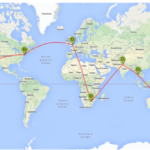One World Round The World: This isn’t just a catchy phrase; it’s a reflection of our increasingly interconnected world. We’ll explore the literal and metaphorical interpretations of this concept, examining the impact of globalization, technology, and cultural exchange. From the ease of instant communication to the persistent challenges of bridging the digital divide and tackling global issues like climate change, we’ll delve into the complexities of creating a truly unified global community.
Get ready for a journey that transcends geographical boundaries and explores the shared human experience.
This exploration will dissect the powerful forces shaping our global village, from the rapid advancements in technology connecting billions to the persistent inequalities that divide us. We’ll analyze successful initiatives fostering intercultural understanding and examine the role of international cooperation in tackling global challenges. Ultimately, we’ll consider the implications of global citizenship and how each of us can contribute to a more equitable and interconnected future.
This isn’t just about geography; it’s about humanity.
The Concept of Global Citizenship: One World Round The World

Global citizenship transcends national borders, recognizing our shared humanity and interconnectedness. It’s not about replacing national identity but enriching it with a broader perspective, acknowledging our responsibilities to the global community and advocating for a more just and sustainable world. This concept emphasizes the rights and responsibilities we hold as members of the global community, impacting everything from environmental protection to economic fairness.Global citizenship necessitates understanding that our actions, no matter how seemingly small, have global ramifications.
The choices we make regarding consumption, resource use, and political engagement ripple outward, affecting people and environments far beyond our immediate surroundings. This understanding fosters a sense of global responsibility, prompting us to consider the impact of our decisions on a global scale.
Global Citizenship versus National Identity, One World Round The World
Global citizenship and national identity are not mutually exclusive. National identity provides a sense of belonging and cultural heritage, while global citizenship expands this perspective to encompass a broader sense of shared humanity and interconnectedness. A strong national identity can even contribute positively to global citizenship by fostering a sense of responsibility to contribute positively to international cooperation and global well-being.
The key difference lies in the scope of one’s focus and responsibilities: national identity centers on loyalty and participation within a specific nation-state, whereas global citizenship emphasizes a commitment to the well-being of the entire world. Think of it like concentric circles: national identity is the inner circle, while global citizenship encompasses a much larger, outer circle.
Examples of Contributing to a More Interconnected and Equitable World
Individuals can actively contribute to a more interconnected and equitable world in numerous ways. Supporting fair trade practices ensures that producers in developing countries receive fair compensation for their work, contributing to economic justice. Advocating for policies that address climate change demonstrates a commitment to environmental sustainability and global well-being, acknowledging the interconnectedness of environmental issues and their impact on all nations.
Volunteering with international organizations or participating in global initiatives like the UN’s Sustainable Development Goals directly contributes to achieving a more equitable and sustainable future. Even small actions, such as reducing one’s carbon footprint or supporting ethical businesses, collectively contribute to a more positive global impact. Consider the impact of a global movement like the fight for human rights; individuals across the globe advocating for justice contribute to a more equitable world.
Ultimately, “One World Round the World” represents both the incredible potential and the significant hurdles we face in creating a truly interconnected and equitable global society. While technology shrinks the world, bridging cultural divides and addressing global challenges requires sustained effort and collaboration. The journey towards a more unified world is ongoing, demanding both individual responsibility and collective action.
The future depends on our commitment to understanding, empathy, and global cooperation—a future where the phrase “One World” isn’t just an aspiration, but a reality.

